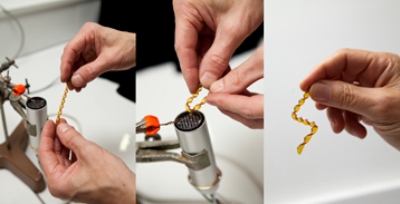Researchers at the Laboratoire “Matière Molle et Chimie” (CNRS/ESPCI ParisTech) have created an innovative organic material that is recyclable and repairable as well as reshapeable at high temperature.
 Sequence showing how a complex-shaped object is made by successively deforming and heating it. © CNRS Photothèque / ESPCI / Cyril FRÉSILLON
Sequence showing how a complex-shaped object is made by successively deforming and heating it. © CNRS Photothèque / ESPCI / Cyril FRÉSILLON
The lightweight and insoluble material also demonstrates some properties of organic rubbers and resins and is hard to break. The low-cost and easily producible material finds use in a broad array of industrial applications, specifically in the leisure, electronics, building, aeronautics and automobile sectors.
The research team has used existing materials to develop the innovative material having a molecular network with special properties. When heated, this molecular network can rearrange by itself without modifying the count of cross links existing between its atoms. It behaves like organic silica, as it demonstrates phase transition similar to glass. It remains insoluble even when heated to a temperature higher than its glass transition temperature.
At room temperature, the novel material resembles either soft or hard elastic solids based on the composition selected. In both forms, it exhibits the properties of rubbers and thermosetting resins such as insolubility, resistance and lightness. Its reshaping capability enables it to be used in processes where thermosetting resins and traditional plastic materials cannot be used. In particular, it can be used to form intricate shapes that cannot be produced using molds or that require high-cost molds.
The novel material can be utilized as the base material of composites to compete with metals in a wide range of industries. Moreover, these findings bring the physics of glass transition, a basic problem, into the limelight.